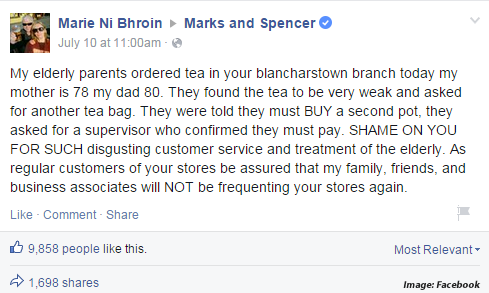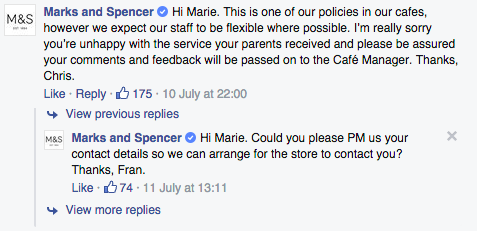Do you know what people are saying about your business? A cell phone, a few keystrokes and anyone can tell the whole world how miserable you made them. It doesn’t even have to be true!
Here’s the fun bit: there’s no expiration date on the internet. A prospect today can be turned off by a review written 5 years ago on a completely different website. Your prospect doesn’t have to do more than a quick search to form a bad opinion of you.
I know you are already shuddering and you should, but I want this to sink home. If the review pushes the right buttons a bad review can go viral before the end of the day.
Just this weekend, Mark & Spencer, a major retailer in the UK learned how fast their reputation can be smeared. A single facebook post caused an uproar that turned into threats of boycotts and protests within mere hours.

The whole PR nightmare was about a weak cup of tea. Too bad M&S didn’t understand how fast that cuppa could splash their reputation. They responded 11 hours later but it was already too late!

Now – three days later – the original post has been liked 10,158 times, commented 896 times with 1748 shares and generated over 30 news articles in major newspapers around the world. Somebody at M&S should be losing their job.
Your reputation is your’s to protect.
Your company might not be an international household name. That just means you have to be faster and better at protecting your brand. Reputation Management means:
-
Monitor (know who is saying what)
The easiest way to monitor your online reputation is to use Google Alerts to see what people are saying about you. Simply fill out the form and you will receive an email every time your terms (your business and website) are mentioned online.
-
Investigate (does the review have merit?)
In the case of the tea bags, Mark & Spencer should assume that the elderly parents were indeed denied a tea bag. Not all complaints are that straight forward. Find out if your reviewer has a legitimate complaint and respond accordingly.
-
Respond (quickly and appropriately)
Assume that every review is believed. A marketing strategist working for the John Kerry for President campaign was putting a response together at the first “Swiftboat” attack. She was told that “no one would believe those lies” and the campaign did nothing. Well, President Kerry won’t be showing up in any history books.
Yelp, a website that is all about collecting reviews, has a great article on responding. They boil the process down to three elements: 1) remember that your reviewers are your customers, 2) they have feelings and 3) they aren’t afraid to share them.
https://biz.yelp.com/support/responding_to_reviews
No one cares about your reputation the way you do.
Whether the review is from a client, a former employee or a competitor – the review reader doesn’t know or care – they just see the stars. 1 star is always unacceptable. 5 stars should always be thanked.
How you respond to online complaints tells all prospective clients how much you value THEM. When a company does their best to make things right that shows. A good response is almost as good as a good review.
~JoMarie




